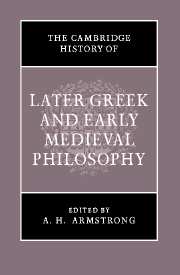Book contents
- Frontmatter
- Chapter 1 Introductory
- Part 1 GREEK PHILOSOPHY FROM PLATO TO PLOTINUS
- Chapter 2 The Old Academy
- Chapter 3 Aristotle
- Chapter 4 The Later Academy and Platonism
- Chapter 5 The Pythagoreans
- Chapter 6 The Peripatos
- Chapter 7 The Stoa
- Part II PHILO AND THE BEGINNINGS OF CHRISTIAN THOUGHT
- Part III PLOTINUS
- Part IV THE LATER NEOPLATONISTS
- Part V MARIUS VICTORINUS AND AUGUSTINE
- Part VI THE GREEK CHRISTIAN PLATONIST TRADITION FROM THE CAPPADOCIANS TO MAXIMUS AND ERIUGENA
- Part VII WESTERN CHRISTIAN THOUGHT FROM BOETHIUS TO ANSELM
- Part VIII EARLY ISLAMIC PHILOSOPHY
- Select Bibliography
- Additional Notes and Bibliography
- Index of ancient and medieval works referred to in the text
- General Index
- Index of Greek terms
- References
Chapter 5 - The Pythagoreans
from Part 1 - GREEK PHILOSOPHY FROM PLATO TO PLOTINUS
Published online by Cambridge University Press: 28 March 2008
- Frontmatter
- Chapter 1 Introductory
- Part 1 GREEK PHILOSOPHY FROM PLATO TO PLOTINUS
- Chapter 2 The Old Academy
- Chapter 3 Aristotle
- Chapter 4 The Later Academy and Platonism
- Chapter 5 The Pythagoreans
- Chapter 6 The Peripatos
- Chapter 7 The Stoa
- Part II PHILO AND THE BEGINNINGS OF CHRISTIAN THOUGHT
- Part III PLOTINUS
- Part IV THE LATER NEOPLATONISTS
- Part V MARIUS VICTORINUS AND AUGUSTINE
- Part VI THE GREEK CHRISTIAN PLATONIST TRADITION FROM THE CAPPADOCIANS TO MAXIMUS AND ERIUGENA
- Part VII WESTERN CHRISTIAN THOUGHT FROM BOETHIUS TO ANSELM
- Part VIII EARLY ISLAMIC PHILOSOPHY
- Select Bibliography
- Additional Notes and Bibliography
- Index of ancient and medieval works referred to in the text
- General Index
- Index of Greek terms
- References
Summary
Pseudepigrapha
We know no Platonist later than the Old Academy and earlier than Eudorus who would have been interested in the Two-opposite-principles doctrine and the attendant horizontal stratification as attributed to Plato by Aristotle. Plutarch, who quotes Eudorus in a different context, knows the doctrine but makes very little of it. However, this does not mean that the doctrine was, before Eudorus, forgotten altogether. It rather seems that, while it lost its home in the Academy (or was relegated to some corner there), it was fully appropriated by the authors of post-Platonic Pythagorean writings. However, they often equate the two principles with Aristotle's form and matter, or with the active and passive principles of the Stoa. Syncretism makes its full appearance.
For our purpose it is best to distinguish three classes of these writings. The first consists of pseudepigrapha. Two names are of particular interest in this group: that of Ps.-Archytas and that of Ps.-Brontinus (assuming the passage by the latter as quoted first by Syrianus, and the passage by the former as quoted by Joh. Stobaeus to belong to the pre-Plotinian period).
Speaking of Brontinus, Syrianus assures us that the Pythagoreans were familiar with the doctrine that there is a principle higher than the two opposite principles. To prove it he quotes Philolaus as having said that God brought forth limit and the limitless; and he says that Archaenetus (there is hardly any reason to change this to Archytas) spoke of a cause prior to a cause and that Brontinus said of this cause that it is above intelligence and being (ousia), surpassing it in power and dignity.
- Type
- Chapter
- Information
- Publisher: Cambridge University PressPrint publication year: 1967
References
- 1
- Cited by

